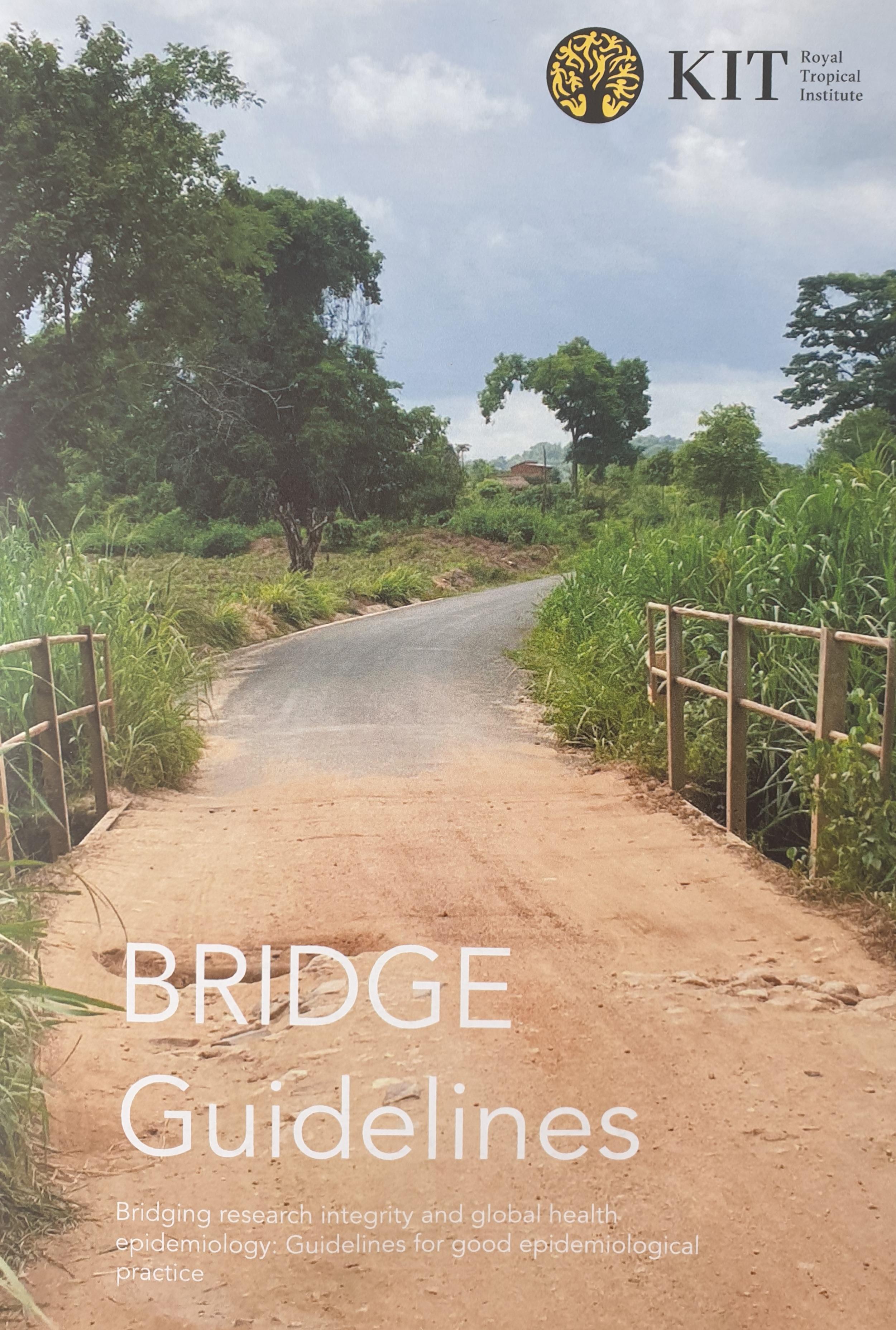Difference between revisions of "Resource:Edb02e27-f2e5-4b75-a78c-ec42e76011f6"
Marc.VanHoof (talk | contribs) |
|||
| (4 intermediate revisions by 3 users not shown) | |||
| Line 1: | Line 1: | ||
{{Resource | {{Resource | ||
|Resource Type=Guidelines | |Resource Type=Guidelines | ||
| − | |Title=Good Epidemiological Practice | + | |Title=Good Epidemiological Practice Guidelines |
| − | |Is About= | + | |Is About=The BRIDGE guidelines for good epidemiological practice in (global health) research have been developed through a Delphi consultation study involving experts with a wide range of experience and expertise in global health and epidemiology. |
| − | < | + | |
| − | + | The guidelines foster high-quality epidemiological studies with impact where it is needed the most: in the local communities and local research systems where the research is conducted. | |
| − | <references /> | + | [[File:Smaller bridge guidelines.jpg|thumb|3711x3711px|Figure 1. Bridge Guidelines Leaflet.]] |
| − | |Important | + | |
| − | + | The guidelines bring together existing principles for research integrity and fairness in one checklist. The checklist focuses on practical implications for research and covers the six steps of study implementation: study preparation, study protocol and ethical review, data collection, data management, analysis, reporting and dissemination.<ref>Alba, S., Verdonck, K., Lenglet, A., Rumisha, S.F., Wienia, M., Teunissen, I., Straetemans, M., Mendoza, W., Jeannetot, D., Weibel, D. and Mayanja-Kizza, H., 2020. Bridging research integrity and global health epidemiology (bridge) statement: guidelines for good epidemiological practice. ''BMJ Global Health'', ''5''(10), p.e003236.</ref><ref>Alba, S., Lenglet, A., Verdonck, K., Roth, J., Patil, R., Mendoza, W., Juvekar, S. and Rumisha, S.F., 2020. Bridging research integrity and global health epidemiology (bridge) guidelines: explanation and elaboration. ''BMJ Global Health'', ''5''(10), p.e003237.</ref><references /> | |
| − | <references /> | + | |Important Because=Research integrity and research fairness have gained considerable momentum in the past decade and have direct implications for global health epidemiology. Existing good epidemiological practice guidelines developed by national epidemiological associations lack international legitimacy and are not tailored to the idiosyncrasies of global health. Existing guidelines for fair and equitable partnerships in global health are not specific to epidemiology. Comprehensive guidelines which tackle both integrity and fairness are needed to provide practical support to epidemiologists navigating the complex global health landscape. |
| + | |||
| + | The BRIDGE guidelines are for all people involved in the commissioning, conduct and appraisal of global health research. | ||
| + | |||
| + | <br /> | ||
| + | <references /><references /> | ||
| + | |Important For=Researchers; Funders; Research Administrators | ||
| + | |Has Best Practice=The BRIDGE guidelines are the proposed best practices | ||
}} | }} | ||
{{Link | {{Link | ||
| Line 17: | Line 24: | ||
}} | }} | ||
{{Tags | {{Tags | ||
| + | |Involves=Royal Tropical Institute | ||
|Has Timepoint=2019 | |Has Timepoint=2019 | ||
|Has Location=Europe | |Has Location=Europe | ||
Latest revision as of 09:17, 13 June 2022
Good Epidemiological Practice Guidelines
What is this about?
The BRIDGE guidelines for good epidemiological practice in (global health) research have been developed through a Delphi consultation study involving experts with a wide range of experience and expertise in global health and epidemiology.
The guidelines foster high-quality epidemiological studies with impact where it is needed the most: in the local communities and local research systems where the research is conducted.
The guidelines bring together existing principles for research integrity and fairness in one checklist. The checklist focuses on practical implications for research and covers the six steps of study implementation: study preparation, study protocol and ethical review, data collection, data management, analysis, reporting and dissemination.[1][2]- ↑ Alba, S., Verdonck, K., Lenglet, A., Rumisha, S.F., Wienia, M., Teunissen, I., Straetemans, M., Mendoza, W., Jeannetot, D., Weibel, D. and Mayanja-Kizza, H., 2020. Bridging research integrity and global health epidemiology (bridge) statement: guidelines for good epidemiological practice. BMJ Global Health, 5(10), p.e003236.
- ↑ Alba, S., Lenglet, A., Verdonck, K., Roth, J., Patil, R., Mendoza, W., Juvekar, S. and Rumisha, S.F., 2020. Bridging research integrity and global health epidemiology (bridge) guidelines: explanation and elaboration. BMJ Global Health, 5(10), p.e003237.
Why is this important?
Research integrity and research fairness have gained considerable momentum in the past decade and have direct implications for global health epidemiology. Existing good epidemiological practice guidelines developed by national epidemiological associations lack international legitimacy and are not tailored to the idiosyncrasies of global health. Existing guidelines for fair and equitable partnerships in global health are not specific to epidemiology. Comprehensive guidelines which tackle both integrity and fairness are needed to provide practical support to epidemiologists navigating the complex global health landscape.
The BRIDGE guidelines are for all people involved in the commissioning, conduct and appraisal of global health research.


